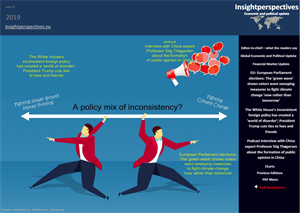
25. April 2024
US GDP Q1 2024: Economy Slows as Spending Cools Amid Inflation Pickup - Bloomberg
25. April 2024
Europe at risk of dying faces big decisions - Macron
25. April 2024
Japanese yen hits fresh 34-year low despite verbal intervention from authorities
25. April 2024
India's Modi under fire for election 'hate speech' against Muslims
25. April 2024
Chinese student in Boston gets 9 months in prison for threatening pro-democracy schoolmate
25. April 2024
'Alarming': North Korea sends delegation to Iran amid suspicions of greater military cooperation24. April 2024 - Articles
Podcast interview with Jacob Kaarsbo: ENGLISH transcript - Must Read - Ukraine, Iran, China, Russia, Donald Trump and what awaits the EU countries in the coming time24. April 2024 - Articles
Germany: The IFO survey continues to show improvement - but the risk of 'profound de-risking' away from China is on the rise22. April 2024 - Articles
A dynamic geopolitical situation could sooner rather than later force the EU to address more aggressively its dependency on China18. April 2024 - Articles
US Philadelphia Fed survey: A new inflation leg is underway in the manufacturing sector18. April 2024 - Articles
The aftermath of Scholz's kowtow: Beijing has a problem if the EU proves to have a backbone - and so will many European companies in China16. April 2024 - Articles
China: 'Impressive' growth number in Q1 if you are wearing blinkers
 Camilla Nørup Sørensen is Associate Professor at the Institute for Strategy at the Royal Danish Defence College in Copenhagen, where she conducts research and teaching within three main areas: 1) China as a major power/Chinese foreign, security and defence policy, 2) Greenland and the Kingdom of Denmark in an Arctic of growing geostrategic importance, and 3) Danish foreign and security policy confronting a world order in flux - with several overlaps among these areas.
Camilla Nørup Sørensen is Associate Professor at the Institute for Strategy at the Royal Danish Defence College in Copenhagen, where she conducts research and teaching within three main areas: 1) China as a major power/Chinese foreign, security and defence policy, 2) Greenland and the Kingdom of Denmark in an Arctic of growing geostrategic importance, and 3) Danish foreign and security policy confronting a world order in flux - with several overlaps among these areas.  She has lived in China for shorter and longer periods over the past 20 years - most recently in 2010-2014, when she was a visiting researcher at the School of International Studies at Peking University with the postdoc project "What kind of world power will China be? Answers from the Chinese debate.” She has published extensively on East Asian security, Chinese foreign, security and defence policy and in recent years on Arctic politics and security with a focus on the implications of growing Chinese presence and activities in the region.
She has lived in China for shorter and longer periods over the past 20 years - most recently in 2010-2014, when she was a visiting researcher at the School of International Studies at Peking University with the postdoc project "What kind of world power will China be? Answers from the Chinese debate.” She has published extensively on East Asian security, Chinese foreign, security and defence policy and in recent years on Arctic politics and security with a focus on the implications of growing Chinese presence and activities in the region.